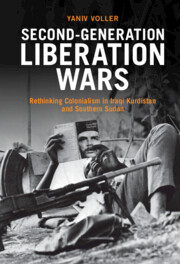Book contents
- Second-Generation Liberation Wars
- Intelligence and National Security in Africa and the Middle East
- Second-Generation Liberation Wars
- Copyright page
- Dedication
- Contents
- Acknowledgements
- Maps
- Abbreviations
- Introduction
- 1 Practices, Roles, Colonialism and Decolonisation
- 2 The Historical and Ideational Context of Postcolonial Liberation Wars
- 3 Postcolonial Governments and Counter-Insurgency
- 4 Second-Generation Liberation Strategies
- 5 Transition in Liberation: From Guerrilla Fighting to State-Building
- Conclusion
- Bibliography
- Index
Introduction
Published online by Cambridge University Press: 17 February 2022
- Second-Generation Liberation Wars
- Intelligence and National Security in Africa and the Middle East
- Second-Generation Liberation Wars
- Copyright page
- Dedication
- Contents
- Acknowledgements
- Maps
- Abbreviations
- Introduction
- 1 Practices, Roles, Colonialism and Decolonisation
- 2 The Historical and Ideational Context of Postcolonial Liberation Wars
- 3 Postcolonial Governments and Counter-Insurgency
- 4 Second-Generation Liberation Strategies
- 5 Transition in Liberation: From Guerrilla Fighting to State-Building
- Conclusion
- Bibliography
- Index
Summary
The formation of postcolonial states in Asia, Africa and the Middle East gave birth to prolonged separatist wars between separatist groups in the periphery and the new, still insecure central governments. This book explores these liberation wars, aiming to provide new insights into their roots and evolution. Rather than focusing on the causes of conflict, the book focuses on the governments’ and insurgents’ strategies and policies. The book’s central argument is that we could best understand these strategies as having been shaped by the struggle against European colonialism. The practices and roles that emerged during that period survived into the postcolonial era, moulding the identities, aims and strategies of both governments and rebels. Therefore, the book suggests that theories of practice and roles in international politics serve as a sound theoretical framework for the empirical analysis of the case studies. The book examines two cases of postcolonial separatist wars: the conflict in Northern Iraq between the government and Kurdish separatists and in Southern Sudan between black separatists and the government in Khartoum. The analysis of these two cases relies on extensive field and archival research. Thus, the book sheds new light on the history and nature of these separatist conflicts.
- Type
- Chapter
- Information
- Second-Generation Liberation WarsRethinking Colonialism in Iraqi Kurdistan and Southern Sudan, pp. 1 - 19Publisher: Cambridge University PressPrint publication year: 2022

